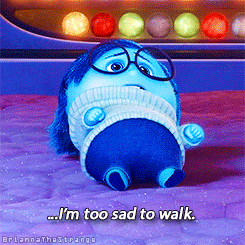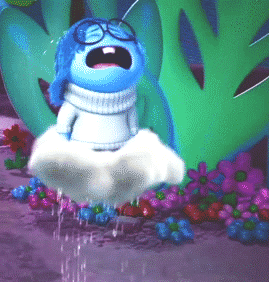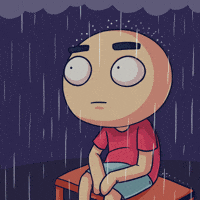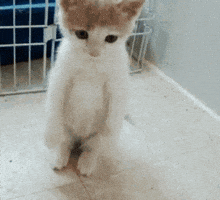Unfortunately, the sad times are upon all of us. In part, the "sad times" are exasperated by Covid-19 and quarantine; however, being in an election year is a sad reality for someone. On Election Day and through the year of campaigning, people are hurt and sadden by opposing views and problematic systems that we as beings live in.
The purpose of this blog post involves to validate that everyone is, in fact, having a hard time right now, and to explain that just because some of our professors, mentors, and friends have been telling us to use self-care, does not mean that we can. Self-care strategies are things that can defuse stress, and take care of your mental and physical health. The Mayo Clinic provides some suggests from self-care such as, taking care of your body, taking care of your mind, connecting with others, and getting help when you need it. The article outlines that practicing the strategies will build support and strengthen relationships, reduce stress triggers, and increase mindfulness about physical well-being. The post should help you critically reflect on your self-care strategies and routines.


When we are talking about hard topics in the classroom, as Communication Scholars often do, we can become fatigued, but sometimes we are fatigued before we ever get to these hard conversations. Whether we like the world changing or not is in material because the world pre-covid is completely than the one we live in during Covid and post-Covid. However, the world changes is not entirely bad because it means that many people are engaging in an entirely new understanding of what self-care is and why it is important.
Our professors encourage us to self-care, but what does that mean? Great question Alyx's hypothetical person. In short, each professor is different and thus has different expectation of disclosure. In my experience, some professors are have verbally acknowledged the need for self-care by saying things that resemble, "make sure you take time for self-care" and "call me whenever you need something". For some instructors, the idea of self-care is merely a progressive thing to offer to students without any real way of knowing how to follow through with providing self-care to students. Self-care is different for each student. For some students self-care is playing a video games. For others, self-care is reading a book. Whereas, sometimes a student needs to not attend class, delay an assignment, or turn the camera off during a zoom class. All of the aforementioned types of self-care are valid, however I find in the world of academia, the line of what we allow as self care is blurred and undefined. The lack of a clear protocol or explanation of self-care in higher-education can cause students to feel isolated, inadequate, and lose determination to engage pedagogically.

Unfortunately, the feeling of losing determination and focus can find its way into future occurrences, changing the trajectory of a students path towards reaching their goals. Instructors play an important role here. Instructors' job is to be understanding and show compassion towards students. Palmer references the concept of "heart work" which plays the role. This role of the instructor is to feel emotions and be vulnerable enough to show compassion as hooks references in Teaching to Transgress. Our goal as instructors goes beyond the classroom and just teaching the material. In order to be engaged as a professor and stay well as an individual who has a life outside of the classroom, one must do self-assessments and evaluate how you are feeling at a given moment. The results of this self-reflection tell you whether or not you should engage in acts of self-care. Once the answer is yes, you know what you should do? ... That's right Alyx's hypothetical self, you should engage in self-care. Take that time for yourself to recover, destress, and re-regulate!
Undoubtable as scholars and instructors, for some of us, we do not always put ourselves first when we should be society, the academy, and ourselves tells as to appease those above us. However, before we can do our best work in a class or on a project we must evaluate how we can take time to be our best selves by asking for help when necessary, be mindful of how physical well-being, access stress levels, and evaluate and connect with our support system. The Mayo Clinic's aforementioned article outlines some good ideas or suggests to getting down with self-care that is a good starting point for anyone in need of some self-love (all of us). Which you can check out: https://www.mayoclinic.org/diseases-conditions/coronavirus/in-depth/mental-health-covid-19/art-20482731.

Let's start taking what we say to our students, colleagues, and friends to heart. "We are here for you," is no longer enough. Lip-service will not suffice the need for instructors who practice "heart work" and compassion. We need to first assess our need for self-care as individuals. Second, we need to self-care! Third, we should reach out to our students with openness and vulnerability to help them in the most successful way possible. Finally, and most importantly, we should follow through with being available and open to accommodations to provide outlets for self-care for students by checking in during class rather than saying "contact me whenever" on the first day and never going beyond those open-promises that the academy expects. #FuckTheNorm
https://www.mayoclinic.org/diseases-conditions/coronavirus/in-depth/mental-health-covid-19/art-20482731
Hi Alyx,
ReplyDeleteThank you for writing such a critically reflective, wonderful blog post about self-care! I really love what you said about Palmer emphasizing that teaching is, in fact, heart work. I believe a holistic approach to teaching also provides room for self-care, as it allows your mind, body, and soul to be taken into account. I wake up early to have some quiet time where I listen to music as I drink coffee before tackling all of my tasks graduate school and teaching require of me. Another strategy that has helped me thus far in graduate school (and especially during the pandemic) is checking in with my family often, whether it is texting them, calling them, or getting on Zoom. I am always adapting my strategies, but those are just a few.
Hi Alyx,
ReplyDeleteThank you for sharing your outlets on self-care! I can definitely agree that the climate we inhabit affects our education, and everything appears very uncertain during these times. Also, I do agree that everyone seems to feel sad lately for many factors, including the weather, the online platform, or just the life we live in overall. Go the world! So thank you for relating and understanding that self-care can be difficult during these times. Showing genuine compassion can last in the long run, even if it's just to hear people out or relate to the challenges of the world. When we say we want to be there for people, let's mean it. To be open and following through. Side note: I want to be here for you.
Hey Alyx,
ReplyDeleteI'm checking out this post after reading your comments on my blog post about struggling--thanks for referring me here because I think this is a great opportunity to dialogue about self-care! As you noticed, most professors will advocate for self-care; however, the efficacy of such advocates varies immensely.
One thing that I really liked about your post was, besides the cute gifs, that you called for us discussing the ways that we should reach out to students about self-care and accommodations. I think that the academy is ablest in many ways--one of which is putting the responsibility on students to advocate for their needs. I wonder how we, as teachers, can create a space where we can implement your call. I think that it helps when teachers disclose when they have or are struggling and what they are doing for their self-care. But, as you noted, this isn't enough; so, I wonder what kinds of classroom techniques we can utilize to help facilitate student disclosure when they are struggling.